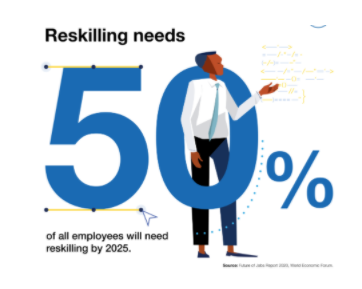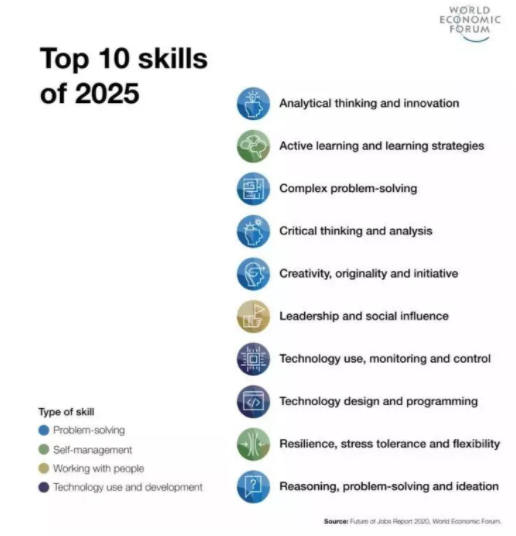The Top Ten Skills of 2025: How do we get them?: WEF Jobs Reset Summit Day 3

Day 3 at the WEF Jobs Summits was all about skills, education and lifelong learning. Leaders and thinkers tuned in from around the world to give their insights on what a Learning Reset will look like for the future of work and how long it will realistically take to get workers trained in the ways they need to build back better. Skills are absolutely critical to this, but how we go about developing them is the key consideration. Here are our top findings and comments from the day:


As Shireen Yacoub, Chief Executive Officer of Edraak for Training & Social Development pointed out, there has been a four-fold increase in people seeking out online learning pathways during the pandemic. During lockdowns and curfews, people have been making use of these economically viable, scalable and self-driven programs.
Jeff Maggioncalda, CEO of Coursera, revealed there has been a 600% increase in usage of their courses from March to June. What’s most striking is “the sustained demand” in “the institutional response,” versus individual users logging on to develop their own skills. According to data, Coursera is now used for training by 3000 businesses and 300 governments, plus educational institutions, illustrating just how collective and mobilized the reskilling revolution has been so far.
As you can see from the chart below, Coursera has been tracking the Top Ten In-Focus Skills and how these have shifted from 2019 to 2020 based on the courses learners are self-selecting and undertaking. Strikingly, interest in soft skills like writing, mindfulness, listening, kindness and gratitude have surged this year among employed workers, while technical skills such as Python Programming and Cloud Computing have dropped significantly.
How long will this reskilling take?
According to the data, 2 out of 3 employers expect a return on investment from reskilling within a year:
However, certain skills will take longer to develop online. These include technical skills such as Cloud Computing and Engineering Skills which will take 4-5 months to develop, versus softer skills such as Content Writing and People Skills that are expected to take 1-2 months.
According to Shireen Yacoub, kickstarting a reskilling revolution depends on four key elements:
- Collaboration and coherent efforts from the public, private and civil sectors.
- Global standards for the design and implementation of these programs.
- More investments in the sectors that will push forward reskilling revolutions.
- More expansion in the definition of basic internet as a human right to ensure no one is left behind.
“It’s critical that the private sector also endorses the alternative credentials that the system offers, because that will signal the value in the market and gives new certification schemes some currency and value,” Yacoub says. Not only will this validate credentials to employers, this will also "encourage uptake among workers" and potentially spur more self-starting or entrepreneurship.
Describing the role of the private sector and businesses in the Reskilling Revolution, Robert E. Moritz, Global Chairman of PwC, said “the only way we get [it] done is the public-private partnerships.” One key way element of this is understanding how remote work differs from in-person operations. We have to be “teaching the teachers how to teach in a remote but distant way,” Moritz said. In PwC’s experience, their leaders have “created capacity in the system to give people time to learn,” not in the classroom, but continuous learning, whether through Google Hangouts, discussions or other interactive methods. Learning to adopt, use and actually apply the new skills is also crucial to creating job opportunities and win-win situations.
Online Learning
One of the key pathways to reskilling is, of course, going to be through online learning. Indeed, 42% of companies are preparing to reskill their workforces through "low-cost online programs." According to the speakers on the panel, ‘Valuing Online Learning for the Workplace,’ this approach needs to be strategic and carefully-planned to maximize investment and time.
Teresa Carlson, Vice-President of Worldwide Public Sector at Amazon Web Services said “the right skills need to be taught properly; we need to make sure that we're teaching skills that allow people to get the job and create economic development.”
As Ravi S. Kumar, President of Infosys pointed out the way we quantify and judge skills has to change. “We depend on pedigree and degrees as a proxy to skills. We need to switch to skills,” adding that online learning in and of itself does not go far enough. “You need to apply a value chain,” that starts with “assessing pathways, assessing capabilities, training and then apprenticeship.” Kumar also believes the success of online learning depends on “adaptive coalitions” between companies and the platforms themselves, allowing us to absorb the learning into how we do our jobs.
Finally, Gabriel Dalporto, CEO of Udacity, re-emphasised the need for coherence, collaboration and consistency when it comes to the various online learning platforms: “how do we know that one machine learning program is equivalent to another? What is that standard we measure ourselves by so that employers have confidence they know what they’re getting?”
Another power-packed day of learning at the WEF Jobs Summit comes to a close. Here are our three main takeaways and outcomes from the Learning Reset day:
- Certifications must be globally recognised and standardized.
- Work under the New Normal will require skills of flexibility and self-reliance.
- Successful reskilling depends on collaboration between the public-private sectors.
The WEF Jobs Summit concludes today with a day packed full of discussions focused on building a more diverse and equitable society.


